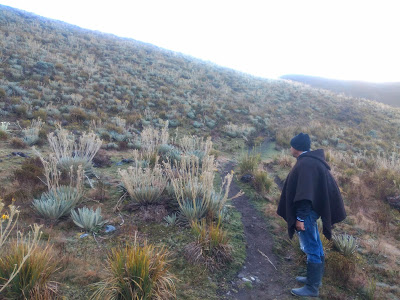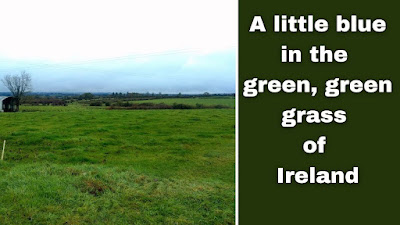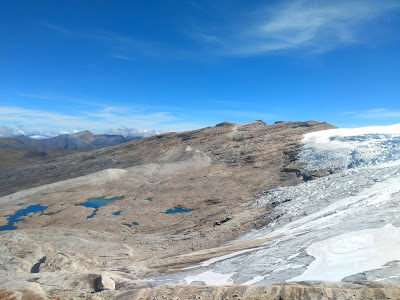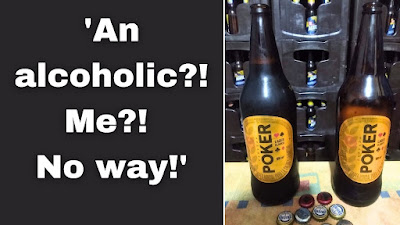@wwaycorrigan[For an audio/vlog version of this story, click
here.]
There are times when, contrary to the lyrics in the popular 1977
Fleetwood Mac song, you
can't go your own way.
 |
| Snow go! This is as close as one can get to the Ritacuba glacier. |
Well, you can't if the place you want to go to is inside a national park with various entry requirements, including the prohibition of unguided treks, forcing one to fork out for a certified guide.
Normally, I find such conditions a turn-off. 'No thanks, I'll do my own thing.'
Reaching Ritacuba
However, some sites are protected in such a manner for the very fact that they are special and thus need to be shielded from
over-tourism.
And a number of these are places that are on my imaginary priority-visit list, among them being treks up to Colombia's highest peaks.
This is what brought me to the chilled-out town of Güicán in the Boyacá department.
At an altitude of about 3,000 metres, it serves as a point of departure for the Sierra Nevada de El Cocuy, Güicán and Chita. Generally, the first of these municipalities, El Cocuy, tends to dominate the
naming rights, but all of the snow-capped peaks in this mountain range are actually in Güicán.
 |
| A lone frailejón: A little further down the mountain, there are thousands of them. |
It was one such peak, Ritacuba Blanco at somewhere between 5,300 and 5,410 metres above sea level — I've seen various figures in that range given — that was on my radar.
A cursory internet check before leaving Bogotá did at least
forewarn me that it wouldn't be a case of simply rocking up to Güicán and from there finding my own way to the snowcaps. Wishful, nay naïve thinking.
Even that
rocking up to the town proved more taxing than it should have been.
Instead of the estimated journey time of nine hours, it took 15. This was due to an on-off mechanical failure with the bus, which eventually resulted in a wait for a replacement vehicle halfway through the trip. When taking
overland transport in Colombia, it's best not to pack punctuality.
As it was a night-time departure, the longer-than-expected journey wasn't a big setback, arriving as we did at Güicán in the early afternoon. (I don't like to get to places I don't know after dusk.)
Being an impromptu trip — it's generally how I travel — the first mission on arrival was to find cheap accommodation.
That, I successfully did in the shape of Hospedaje Casa Grande — one can't go too wrong with a room for 25,000 pesos per night.
Its owner, the helpful Wosvaldo, quickly got the necessary planning in motion for my trip to Ritacuba.
Wosvaldo also offers his taxi services to and from the control/entrance point, some 17 km from Güicán via unpaved roads and 1,000 metres higher up. So he, like most accommodation providers in the town, has skin in the treks-to-the-Sierra Nevada game.*
'The trek up itself, from 4,000 to 4,800 metres through kilometres of frailejón-filled land, is mild enough.'
First on that planning list was the need to source a guide. Wosvaldo, unsurprisingly, had one to hand: the rather genteel Luis Emilio.**
Once Luis Emilio confirmed his ability for the next day, the next step was to pay the entrance fee to the national park. For me, as a foreigner with a Colombian-issued ID, it was 41,500 pesos. For non-resident foreigners, it's about double that, for Colombians it's half that.
 |
| Ruana-clad guide Luis Emilio examines the frailejones. |
This payment is made at an office in the town, next to which is the company providing the compulsory insurance. For two people, the guide and me, that cost 15,200 pesos.
The final requirement was to connect to a roughly 30-minute online induction chat provided live by a National Natural Parks of Colombia (
PNN) employee. That takes place at 4 pm each evening and covers the three permitted treks inside the Sierra Nevada de El Cocuy, Güicán and Chita National Natural Park.
Do note, the entrance fee is valid for three days so if one has the desire — and more limiting in my case, the
dinero, the money — the three treks can be done over three days.
When going it alone, as in not through an agency, the guide and the insurance are daily expenses. There are various accommodation options closer to the park entrance, so one could save on travel costs to and from Güicán by staying in one of those.
Photos show that the other two treks are equally as impressive as Ritacuba but my focus was on getting as close as possible to the highest peak with the most extensive glacier. It is, by the way, prohibited to actually walk on or even touch the glacier and snow.
Snow show
The trek up itself, from 4,000 to 4,800 metres through kilometres of frailejón-filled land, is mild enough. Some may have issues with the oxygen-light air but thankfully that wasn't a problem for me.
We started our ascent at dawn, just before 6 am, and arrived at the glacier shortly after 8.30 am, with a short snack stop included along the way. As guides go, Luis Emilio and I were pretty much in sync pace-wise.
While I may be accused of taking a very easy out here, particularly as a blogger, I feel describing the glacier and the sights all around with words is insufficient. To address this shortcoming, I recorded a few YouTube Shorts videos which you can find at
https://youtube.com/shorts/ZHGESHxM0no and
https://youtube.com/shorts/JhaN7B4D4x4.
'Güicán is up there as the ruana-wearing capital of Colombia. It's easier to keep track of those not donning this traditional garb than those with it.'
Having soaked in the splendour for half an hour or so, we started our descent to the entrance point just as the clouds began to roll in. Yes, luckily Mother Nature shone on us that morning. No doubt dark skies and precipitation would have dampened the wonderland experience somewhat — although a snow shower would have been nice.
My visit was during a tourist-light period, so Luis Emilio and I had the glacier viewing point to ourselves. I'm guessing it's different during high season. The Ritacuba trek, though, is limited to fewer than 80 tourists per day.
Güicán itself doesn't give off an obvious tourist vibe, whether one views that as good, bad or indifferent. There's certainly no international flair to it. It maintains its basic Boyacá market-town flavour.
It's also certainly up there as the ruana-wearing capital of Colombia. It's easier to keep track of those not donning this traditional garb than those with it.
Respected traditions notwithstanding, one might expect Güicán to have at least one establishment that prepared coffee to more
cosmopolitan standards i.e.
not greca-brewed fare that at best merely gives a hint as to what good coffee can taste like.
Offering quality, machine-brewed fare wouldn't exactly be a portent of pernicious change, would it? Other similar towns have seen the light. Both Luis Emilio and Wosvaldo were receptive to my suggestion in any case; it seemed to spark a business idea in them. I hope they don't forget me when the pesos come pouring in.
Death valley
Coming back to natural attractions, outside of the Sierra Nevada treks, there are plenty of walks to other sites that one can wander cost-free and unguided.
One of particular interest is
Peñón de los Muertos, Rock of the Dead, seven kilometres to the east of Güicán and a few hundred metres higher.
Here, so the story goes, many U'wa indigenous took the
roughly 400-metre suicidal plunge to the River Cóncavo below rather than be taken captive by the Spanish conquistadores. The ultimate
flight reaction to a threatening situation.
 |
| Fancy a cool dip?! The glacial waters of the River Cóncavo. |
Mentioning the River Cóncavo, but not at all in a macabre sense, relaxing by its fast-flowing glacial waters is a nice way to waste away an afternoon, particularly when the sun shines, as it regularly did during my four-day stay.
Indeed, with nobody about, it's perfect for a chilly skinny dip, if it can be braved. It works wonders to clear away any cobwebs.
So you see, you can go your own way in Güicán and have plenty of innocent enjoyment in the process.
Going to see the Sierra Nevada snow show is another matter. It's well worth the extra effort, though.
*Wosvaldo, the owner of the cheap and cheerful Hospedaje Casa Grande and offerer of chauffeur services to the national park, can be contacted by WhatsApp on +57 313 8682814.**The certified guide Luis Emilio's WhatsApp number is +57 314 2904721. One guide can take up to five people, so going with others is one way to keep costs down, in terms of both paying for the guide and transport to the National Park control point.__________________________________________________________
Listen to The Corrigan Cast podcast
here.
Facebook:
Wrong Way Corrigan — The Blog &
IQuiz "The Bogotá Pub Quiz".





.jpg)











